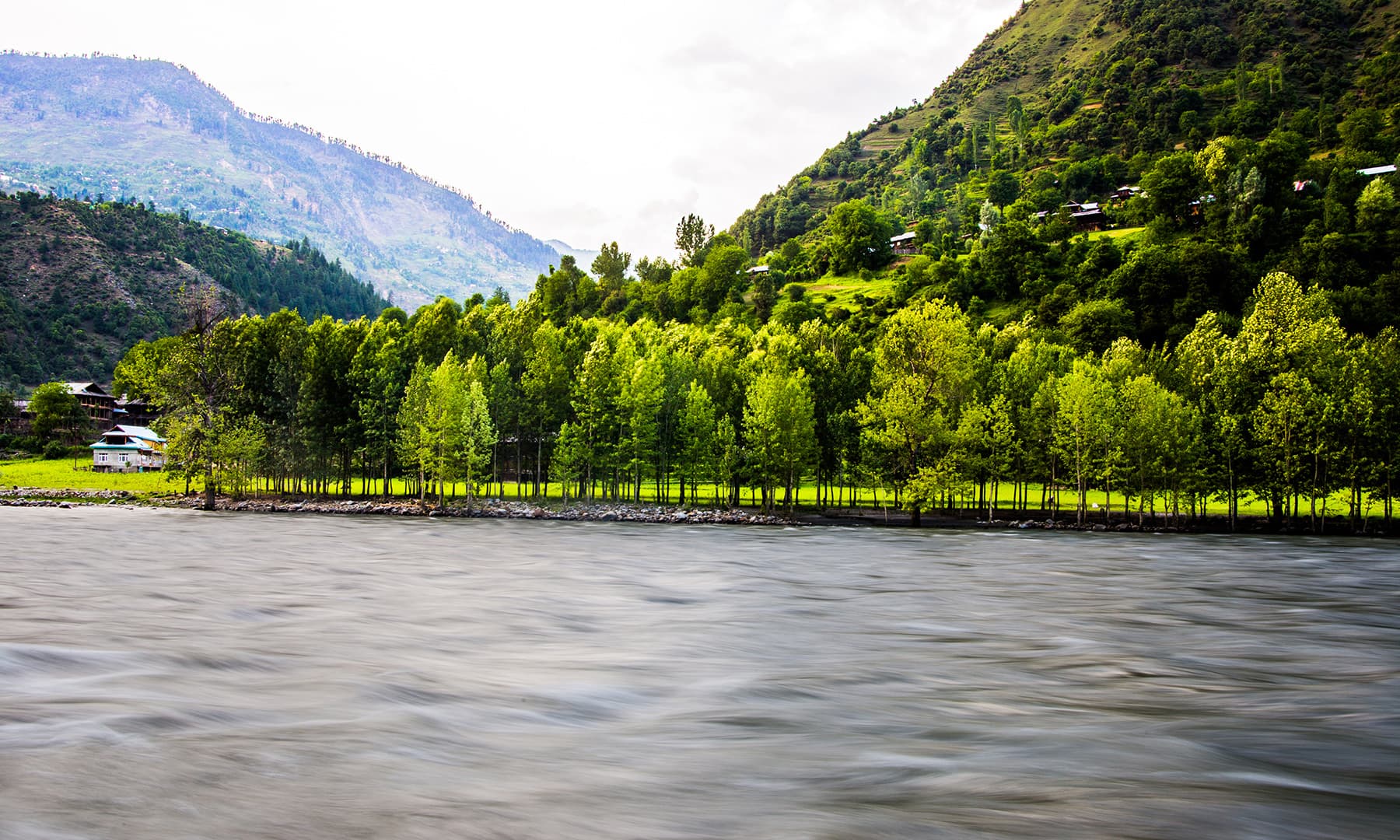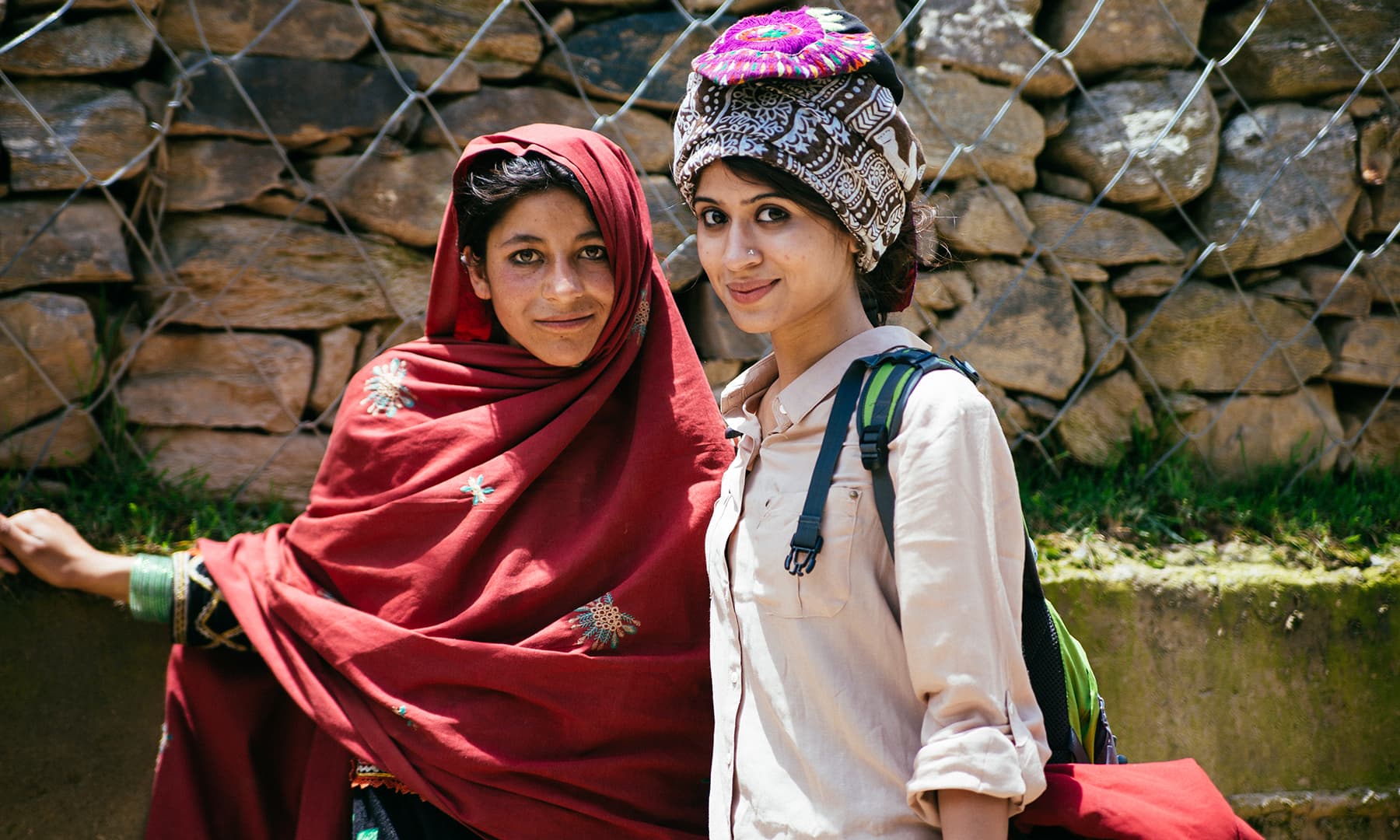My great grandfather used to narrate to me tales of a valley which was nothing short of paradise on earth. He spoke of its clear waters and chilly summers; its orange autumns and snowy winters; its beautiful people and blood stained history; but mostly, of the urge to cross the river and unite with his people.
I believe there is only one such place in this land that would fit the narrative and knows of the heart’s desire to be united with those who live in the land so close and yet so far – Kashmir.
The destination for our annual company trip this year was set to Neelum Valley. Situated in the Azad Kashmir region, the valley stretches from 50 kilometers north of Muzaffarabad to the existing LoC between Azad Kashmir and Indian-held Kashmir.
 |
En Route Keran. —Marvi Soomro |
 |
Kundal Shahi en route Keran. —Marvi Soomro |
Nearly 120 colleagues from Lahore and Islamabad set forth for a weekend getaway. As we ascended, the lush green mountains and gushing rivers of Neelum accompanied us. The breeze turned chilly and the sunlight shone on the valley like a million little glittery specks.
Our first stop after some 10 hours of travelling was the dense green village of Keran.
This is the closest you can get to Indian-held Kashmir today, which runs just across the River. The Keran View Hotel has a spectacular backyard that touches the Neelum River; its clear blue waters separating you from the banned side.
 |
The Keran View Resort. —Marvi Soomro |
 |
At the banks of the Neelum River in Keran. —Marvi Soomro |
Standing by the riverside and looking across, you realise life is not so different on the other side; the neatly aligned wooden houses are exact replicas of the ones where I stood, among women working in the fields and children playing by the banks of Neelum.
The absence of mobile signals/internet services is a strange and wonderful liberation. The focus is no longer on a social network check-in, instead it is on the serenity of this place, sinking in until you are separated from the rest of the noisy world.
For adventure-seekers, Keran is usually a mid-stop before ascending further up, and so was the case for us. After a round of garma garamchai and pakoray from a roadside shack, we were all set to travel to our next destination.
 |
Chai at Keran. —Marvi Soomro |
On a 3.5 hour travel from Keran is the quiet village of Shardha, said to be named after a legendary princess. Just off the main road and connected by a suspension bridge, the village is an epitome of serenity.
As we set camp, the night awed us by an unadulterated blackness, the twinkling skies, and the reflections in the river; the morning too, stunned us with a view of the snow-covered Noorinar peak, standing tall in the background.
Contrary to when travelling in Gilgit Baltistan, the Neelum Valley does not offer you many options in terms of where you can stay and what you can eat. This part of Pakistan lags behind not just in tourism facilities, but also in the number of tourists it receives each year.
A desi breakfast of omelettes and parathas with cups of tea to wash it down is all you will find around this area, but it’s enough to fill your stomach and charge you up for the adventures ahead.
 |
Locals en route Keran. —Marvi Soomro |
 |
Locals at Shardha. —Marvi Soomro |
 |
The Neelum River. —Marvi Sirmed |
 |
Starry skies in Shardha. —Asif Mahmood |
A trip to Neelum is incomplete without taking up on at least one of the adventurous hikes the region offers. From Shardha, we began a two-hour bumpy jeep ride to the Kel Village.
The road to Kel, wide enough for one vehicle to pass at a time, often experiences landslides. The majestic views of the valley can be best seen on the way to Kel, with the noisy blue waters of the Neelum River flowing on one side, and crystal clear waterfalls on the other.
You'll see glaciers camouflaged as muddy mountains melting and merging with the torrential waves of Neelum. And the scattered local houses and people working in their terraced farms going about daily affairs.
 |
Locals at Kel. —Asif Mahmood |
The village of Kel is located near the Line of Control, so you will see a lot of Pakistan Army commuters on this path. Sitting on top of the jeep watching a military truck pass by, the “jazba junoon” that Ali Azmat sang of could not be restrained, we crossed by shouting slogans and saluting the jawaans and received warm smiles and waves in return.
From Kel, a two-kilometer trek through the mountains to a hilltop takes you to the village of Arang Kel, the last mountain in this area, beyond which lies Indian-held Kashmir. The trail is followed by the blue waters of Neelum before it is enveloped by dense forest growth.
 |
The trek to Arangkel. —Asif Mahmood |
 |
Trekking in Kel. —Marvi Soomro |
 |
Shaista, a grade-5 student at Kel. —Marvi Soomro |
 |
The beauty who gifted me her Kashmiri cap. —Marvi Soomro |
 |
With the local schoolgirls. —Marvi Soomro |
The trek is strenuous, but not too difficult on normal days. However, if it rains, the story is entirely different as the trail turns muddy and slippery.
The universe had conspired to give us the adventure that we had asked for and we got the latter. Wet and mud-caked, we made our way to the top of the mountain and what we saw left us speechless.
Lush green meadows spread out as far as the eye could see. Small but neatly constructed wooden houses standing out in contrast to the greens of the village. Snow-covered mountain peaks laying a siege all around us. The tussle between the sun and clouds giving the meadows a dreamy look and a chilly breeze to complement it all – this is the village of Arang Kel.
 |
The picturesque Arang Kel village. —Asif Mahmood |
 |
Huts in Arang Kel village. —Asif Mahmood |
 |
Farmland, houses and mountains. —Asif Mahmood |
 |
Waterfalls in Arang Kel. —Asif Mahmood |
 |
Some stone, some wood: A house in Arang Kel. —Asif Mahmood |
The return hike from Arang Kel was everything an adventure junkie dreams of. By the time we began the descent the sun had set, the post rain trek was the kind that sucks your feet in. Each step was a fight against the grubby and grimy ground to be taken with caution.
Walking through the trek in daylight gives you picturesque views of the peaks, waterfalls and the Neelum River. Walking through it at night with torches as the only source of light, leaves you mesmerised. The ginormous trees give off a mythical feel, casting spooky shadows. With the sky a black canvas of glittery specks, the torrential voice of the Neelum River is your only guide to how far you are from the finish point.
 |
More wooden huts at Arang Kel. —Asif Mahmood |
 |
Sun and shadows. —Asif Mahmood |
 |
Snowy tops, wooden huts and green meadows in Arang Kel. —Asif Mahmood |
 |
Starting the journey back from Arang Kel. —Asif Mahmood |
In today’s fast-paced world of commercialism and perpetual digital connectivity, Neelum Valley is the perfect getaway. Stand by the banks of the noisy River and let the silence fill you with peace.
Life is simple here. And magnificent. It pleases the heart to see the smiles and experience the cordiality of people who have lived here, on the brink of war for all these years.
This 200-kilometer-long bow-shaped valley sings songs of pain which yearn in unison with songs of splendour. This 200-kilometer long valley is, as my great grandfather would say, truly paradise on earth.
 |
Marvi Soomro is an IT consultant, who survives corporate monotony by travelling the world and capturing its words and pictures.
She is a patriotic at heart who is passionate about travelling across Pakistan and bringing to light the rich natural and cultural heritage of the country.